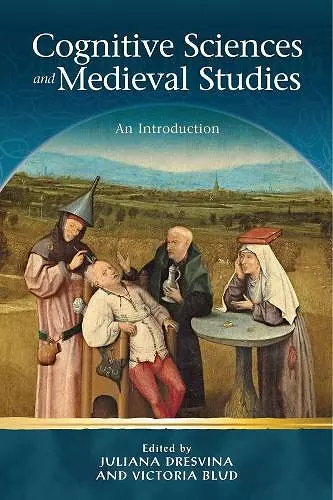Cognitive Science and Medieval Studies
An Introduction
Juliana Dresvina editor Victoria Blud editor
Format:Hardback
Publisher:University of Wales Press
Published:15th Nov '20
Should be back in stock very soon

* This study brings together medieval studies and cognitive methodologies in a study specifically aimed at medievalists. * It presents a longer history of certain mental health conditions and locates contemporary debates about the mind in a broader historical framework. * It considers both the benefits of incorporating insights from contemporary neuroscientific and cognitive studies into the exploration of the past, and the benefits of employing historical models and case studies in order to reflect on modern methods.
This book argues for the value of applying methods deriving from cognitive sciences (such as neuroscience or psychology) to studies of medieval history, literature, art and culture, and suggests ways in which this comparative approach might be achieved.With the rapid development of the cognitive sciences and their importance to how we contemplate questions about the mind and society, recent research in the humanities has been characterised by a 'cognitive turn'. For their part, the humanities play an important role in forming popular ideas of the human mind and in analysing the way cognitive, psychological and emotional phenomena are experienced in time and space. This collection aims to inspire medievalists and other scholars within the humanities to engage with the tools and investigative methodologies deriving from cognitive sciences. Contributors explore topics including medieval and modern philosophy of mind, the psychology of religion, the history of psychological medicine and the re-emergence of the body in cognition. What is the value of mapping how neurons fire when engaging with literature and art? How can we understand psychological stress as a historically specific phenomenon? What can medieval mystics teach us about contemplation and cognition?
“This collection strikes out boldly: refusing to prioritise the sciences as automatically primary in epistemological or methodological terms; exposing the central concept of neuromedievalism to critique; and inviting contributors and readers alike to consider the bases, possibilities, and limits of its capacity to enlighten. The result is enlivening. This fascinating collection offers no simple blueprint for applying cognitive sciences to medieval questions (or vice versa) but rather encourages us to consider what value might be added to each by bringing the two together. There will be some dead ends, it acknowledges, but the potential for mutual enrichment is real and exciting.”
-- Kathleen Neal, Monash University
ISBN: 9781786836748
Dimensions: unknown
Weight: unknown
336 pages